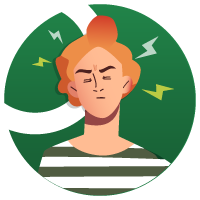Overview
- Everyone experiences a feeling of panic and anxiety at certain times. It's a natural response to stressful situations. But someone with panic disorder has the feeling of stress, anxiety, and fear regularly, often without any reason.
- A panic attack is an instant episode of extreme fear that triggers physical reactions when there is no real danger or cause around.
- When panic attacks occur, you might think you’re having a heart attack, dying, or losing control.
- Many people have one or two panic attacks in their lifetimes, and the problem ends when a stressful situation goes away.
- One in 10 adults in the United States suffers from panic disorder every year, and it occurs between the ages of 15 and 25. It’s more common in women than men.
- Panic attacks aren't life-threatening but can be frightening and affect your lifestyle if left untreated. Therapy and anxiety medications can help prevent panic attacks.


Panic attacks include physical signs that might feel like a heart attack, such as tingling, rapid heart rate, or trembling. Many people with panic disorder worry about the chances of having another attack and change their life to prevent another attack.
Panic disorder is a type of anxiety disorder. Anxiety and panic attacks can occur as rarely as a few times a year or several times a day. It begins in the late teens or early childhood. Women are more likely than men to have panic disorder.
Panic Disorder Symptoms
Most often, panic disorder occurs "out of the blue." There is no way to stop a panic attack when it starts. Its signs and symptoms usually stay for 10 minutes after an attack and disappear later. Some physical symptoms of a panic attack include:
- Chills
- Chest pain
- Difficulty breathing
- Choking
- Intense terror feeling
- Pounding heartbeat
- Sweating
- Shaking
- Throat tightness
- Belly cramps
- Headache
- Fear of losing control or dying
Panic Disorder Causes
Experts don't know what exactly causes panic disorder, but a possibility is that in people who have it, their brain may be sensitive in responding to fear. There is a link between panic attacks and phobia. There is also a theory that oversensitivity to carbon dioxide makes your brain think you're suffocating, which causes panic disorder.
Panic attack causes are not fully understood, and research is ongoing. However, the following factors can trigger the panic disorder:
| Causes | What does it entail? |
| Family history | It runs in families, but no one knows exactly why some family members have panic disorder while others don’t. |
| Mental health issues | People with depression, stress, anxiety, and other mental illnesses are more prone to panic disorder. |
| Substance abuse problems | Alcohol and illegal drug addiction can trigger the risk of having panic disorder. |
| Medications | Some medications, such as antidepressants, can cause severe panic attacks. |
Panic Disorder Treatment
Psychotherapy, medication, or their combination is an effective panic disorder treatment. How long you’ll need treatment based on the severity of your problem and how you respond to treatment.
Panic attack treatment options include:
- Psychotherapy
With cognitive-behavioral therapy (CBT), you can discuss your thoughts with a mental health professional. They help identify panic attack triggers so you can change your thinking, behavior, and reactions. When you respond differently to triggers, panic attacks decrease over time.
- Antidepressants
Certain antidepressant medications prescribed by a doctor can make the panic attack less severe.
- Anti-anxiety depressants
Benzodiazepines are the most common anti-anxiety medication to treat and prevent panic attacks. They offer panic attack help but have risks of addiction or dependence.
Getting an Online Doctor Consultation through Telehealth Services at Omni Help
Many of you might not be in an area where you can access quick and efficient healthcare services. Others might have transportation issues or a physical disability. The COVID-19 pandemic has disrupted the normal functioning of many hospital services as well. You can easily consult a doctor, get a prescription, and suggestions on which tests to get online from a medical expert at Omni help.
You can access a qualified doctor online and have an online medical consultation in the safety of your own house.
If you want to talk to a doctor online right now or set up a virtual doctor appointment, click down below.
If you're having panic attacks, you may ask your healthcare provider for reasons for having panic attacks. You should ask about the best treatment for panic attacks, how long you'll need therapy and medication, and what would be the side effects of medication.
Medical or mental health providers can help diagnose panic disorder when you have repeated panic attacks and worry about having more panic attacks. It can also be diagnosed when you obsess about losing control during a panic attack and change your behavior to avoid situations that trigger a panic attack.
Calm breathing can reduce the symptoms of panic attack disorder. Try practicing calm breathing twice per day for at least 5 minutes. It regulates your oxygen intake and prevents the dizziness and tingling situation connected with over-breathing.
You should contact your doctor if panic attacks and chronic anxiety interrupt your daily life. In case of difficulty concentration, irritability, agoraphobia, and sleep problems, you should seek help.
Panic attacks are tough on the mind and body both. Sometimes you feel tired after having one. If you're somewhere you can rest, go for it. You can also relax and rest for a few days after having a panic attack, so your body has time to recover.
Join Our Newsletter Now
Subscribe to get information about Omni Help
